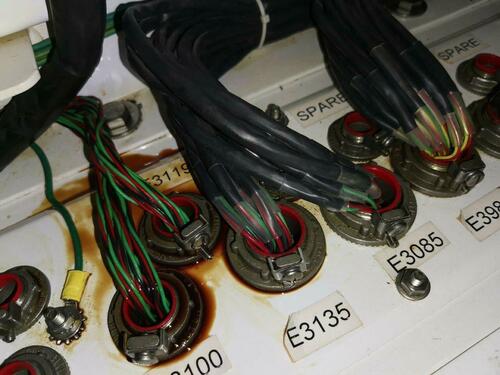Russia Admits Weaponization Of Gas, Halts NS1 Shipments “Until Sanctions Lifted” As EU Prepares Response To Energy Crisis
Putin is done playing around.
Two days after Russia indefinitely halted nat gas supplies via the Nord Stream 1 pipeline for the amusing reason that there was an “oil leak” (shown below)…
… on Monday Russia finally admitted what everyone has known since February – namely that it has weaponized commodities in response to the West’s weaponization of currencies (as Zoltan Pozsar has said all along),when the Kremlin said that Russia’s gas supplies to Europe via the Nord Stream 1 pipeline will not resume in full until the “collective west” lifts sanctions against Moscow over its invasion of Ukraine.
Putin’s spokesman, Dmitry Peskov, blamed EU, UK, and Canadian sanctions for Russia’s failure to deliver gas through the key pipeline, which delivers gas to Germany from St Petersburg via the Baltic sea.
“The problems pumping gas came about because of the sanctions western countries introduced against our country and several companies,” Peskov said, according to the Interfax news agency. “There are no other reasons that could have caused this pumping problem.”
Peskov’s comments were the most stark demand yet by the Kremlin that the EU roll back its sanctions in exchange for Russia resuming gas deliveries to the continent. It also confirms that Russia no longer needs to pretend it needs to export commodities to Europe – after all it has more than enough demand in China and India – and is willing to give Europe just enough to rope to… well, you know the rest.
On Friday, Gazprom said it would halt gas supplies through Nord Stream 1 because of a technical fault, which it blamed on difficulties repairing German-made turbines in Canada. We now know that was a strawman; and in the latest confirmation of who has the upper hand in the ongoing commodity feud, the EU had already rolled back some sanctions against Russia explicitly to allow the turbines to be repaired. European leaders have said there is nothing to prevent Gazprom from supplying the continent with gas and had accused Russia of “weaponising” its energy exports.
Meanwhile, as we reported over the weekend, Russia is still supplying gas to Europe via Soviet-era pipelines through Ukraine that have remained open despite the invasion, as well as the South Stream pipeline via Turkey. And in an ironic twist, the head of the Ukraine gas transit operator told Reuters that Ukraine could “technically” substitute full capacity of Nord Stream 1 via Ukraine’s Sudzha entry point. In other words, Europe would pay Putin billions for Russian gas transiting through Ukraine with Russia using proceeds to fight Ukraine…
Of course, nothing in today’s “news” should come as a surprise: Russian officials have made little secret of their hope that the growing energy crisis in Europe will sap the bloc’s support for Ukraine. “Obviously life is getting worse for people, businessmen, and companies in Europe,” Peskov said. “Of course, ordinary people in these countries will have more and more questions for their leaders.”
One not so ordinary person was Matteo Salvini, the leader of Italy’s far-right League party, who said that Western sanctions against Russia are not working and actually harm Italy, and suggesting allied countries should reconsider their approach. Speaking at a conference of political leaders Sunday on Lake Como, Salvini claimed the sanctions meant to punish Moscow over its invasion of Ukraine had in fact helped Russia, resulting in an export surplus of $140 billion, during the year ending July 2022. “Do we have to defend Ukraine? Yes,” Salvini said. “But I would not want the sanctions to harm those who impose them more than those who are hit by them.”
Former Russian president Dmitry Medvedev was even more explicit than Peskov, and after German chancellor Olaf Scholz announced a €65bn aid package on Sunday to soften the blow of soaring energy bills, Medvedev, now deputy chair of Russia’s security council, said Germany was “acting as an enemy of Russia” by supporting sanctions against Moscow and supplying Ukraine with weapons. “They have declared hybrid war against Russia,” Medvedev wrote on Telegram. “And this old man acts surprised that the Germans have some little problems with gas.”
Of course, with neither side willing to ease back on its approach, moments after Russia’s comments, EU Commission president Ursula von der Leyen, twitted that “Putin is using energy as a weapon by cutting supply and manipulating our energy markets”, which of course he is doing in response to the west’s weaponization of currencies and capital flows.
Adding that “He will fail. Europe will prevail”, Van Der Leyen confirmed what we reported yesterday, namely that “the @EU_Commission is preparing proposals to help vulnerable households and businesses to cope with high energy prices” and aims to:
- Reduce electricity demand (peaks)
- Price cap on Russian pipeline gas
- Help vulnerable consumers & businesses with revenue from the energy sector
- Enable support to electricity producers facing liquidity challenges linked to volatility
The @EU_Commission proposal will aim to:
• Reduce electricity demand (peaks)
• Price cap on 🇷🇺 pipeline gas
• Help vulnerable consumers & businesses with revenue from the energy sector
• Enable support to electricity producers facing liquidity challenges linked to volatility— Ursula von der Leyen (@vonderleyen) September 5, 2022
Will it work? Of course not, because Russia will never agree to sell to those imposing price caps (especially since China and India will never join), while ordinary Europeans will never agree to voluntarily sacrifice their own comfort without the knowledge that everyone else is also sharing in the burden. Which is why the announcement by French president Macron, calling for 10% reduction in country’s energy use to avoid rationing and cuts this winter, will achieve nothing at all and Europe will have no choice but to ration in a few months as the winter freeze arrives.
Tyler Durden
Mon, 09/05/2022 – 13:05
via ZeroHedge News https://ift.tt/rLzVub1 Tyler Durden
